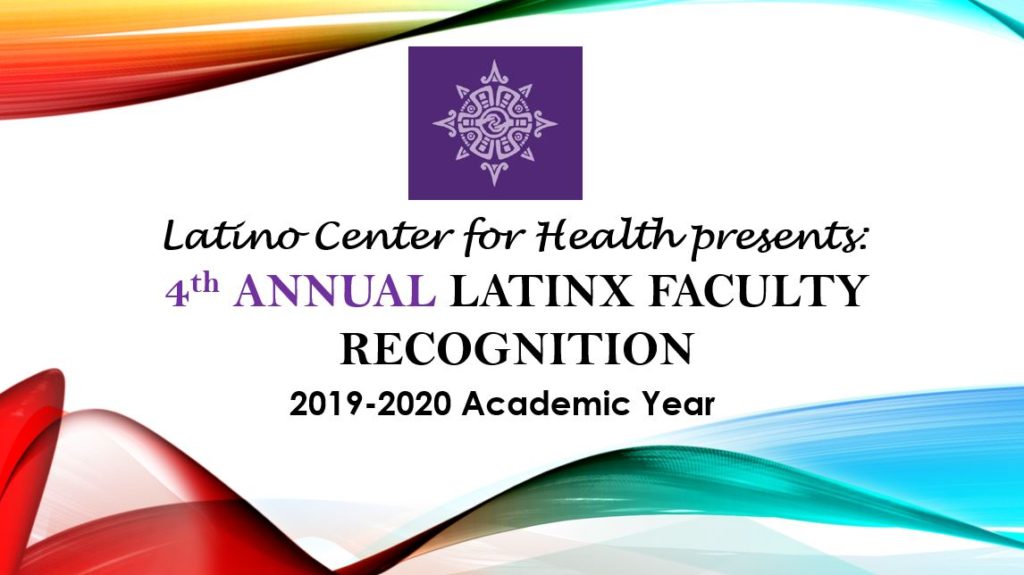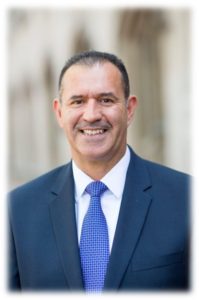The Latino Center for Health is pleased to announce the 32 Latinx faculty members at the Tacoma, Bothell, and Seattle campuses of the University of Washington being recognized for their scholarly achievements this academic year. Notably, eight of the 32 being recognized are from UW Tacoma and one is from UW Bothell.
Faculty were recognized for meeting at least one of the following criteria during this academic year: 1) publishing a scholarly article in a high impact journal or an influential book, 2) receiving a major grant, 3) being appointed to a significant leadership position, 4) being promoted to associate or full professor, and 5) retiring by the summer of 2020.
“I wish we all could be together to celebrate and honor the outstanding scholarly achievements of this year’s 32 remarkable Latinx faculty members at the Tacoma, Bothell, and Seattle campuses of the University of Washington,” says Dolores Huerta, a nationally renowned labor leader and civil rights activist who was scheduled to be the keynote speaker for this year’s Latinx Faculty Recognition Event, which was cancelled due to the pandemic. “Though we are apart due to COVID-19, I want to share my heartfelt congratulations to all of you.”
You can watch Dolores Huerta’s video message to the faculty honorees here, and President Ana Mari Cauce’s video message here.
These 32 faculty represent a variety of disciplines, including aquatic & fishery sciences, history, biostatistics, international studies, microbiology, business, arts, communication, health services, and more. Some of their publications include Feminist Responses to the Neoliberalization of the University: From Surviving to Thriving, Amplifying RNA Vaccine Development, and Ongoing Obstacles to Confronting Microagressions in Medicine, just to name a few.
“The impact of these Latinx faculty resounds across the UW community, from classrooms and laboratories, to diverse communities and fields of practice, and throughout the world,” says Dr. Gino Aisenberg, associate professor in social work and co-director of the Latino Center for Health.
“But more than your scholarly contributions, you are role models and mentors, particularly to our Latinx students who see you, look up to you and know that si se puede, si se puede,” adds Dolores Huerta.
The 32 faculty recognized this year are:
- Gabriel Gallardo, Associate Vice President, Office of Minority Affairs & Diversity and Affiliate Associate Professor, Geography
- Juan Guerra, Professor & Chair, American Ethnic Studies
- Gino Aisenberg, Associate Professor, Social Work and Co-Director, Latino Center for Health
- Cecilia Aragon, Professor, Human Centered Design & Engineering
- Maria-Tania Bandes-Becerra Weingarden, Lecturer, Culture, Arts & Communication, University of Washington-Tacoma
- Barbara Baquero, Associate Professor, Health Services
- Ruben Casas, Assistant Professor, Culture, Arts & Communication, University of Washington-Tacoma
- Sarah Chavez, Lecturer, Culture, Arts & Communication, University of Washington-Tacoma
- Joana Cunha-Cruz, Research Associate Professor, Oral Health Sciences
- Sonia de la Cruz, Assistant Professor, Culture, Arts & Communication, University of Washington-Tacoma
- Alejandro Francetich, Assistant Professor, School of Business, University of Washington-Bothell
- Deborah Fuller, Professor, Microbiology
- Maria Elena Garcia, Associate Professor, International Studies
- Angelina Godoy, Professor, Law, Societies & Justice
- Ricardo Gomez, Associate Professor, Information School
- Luis Gonzalez-Cuyar, Assistant Professor, Pathology
- Catherine Hough, Professor, Pulmonary, Critical Care & Sleep Medicine
- Lurdes Inoue, Professor & Chair, Biostatistics
- Jose Antonio Lucero, Associate Professor & Chair, Latin American & Caribbean Studies
- Roberto Montenegro, Assistant Professor, Psychiatry & Behavioral Sciences
- Leo Morales, Professor & Chief Diversity Officer, School of Medicine
- Itziri Montero Villamar, Full-time Lecturer, Culture, Arts & Communication, University of Washington-Tacoma
- Ariana Ochoa Camacho, Assistant Professor, Social & Historical Studies, University of Washington-Tacoma
- India Ornelas, Associate Professor, Health Services
- Johnnie Orozco, Assistant Professor, Hematology
- Jacqueline Padilla-Gamiño, Assistant Professor, Aquatic & Fishery Sciences
- Maggie Ramirez, Assistant Professor, Health Services
- Alyssa Ramirez Stege, Assistant Professor, Social, Behavioral & Human Sciences, University of Washington-Tacoma
- Rosana Risques, Associate Professor, Pathology
- Ileana Rodriguez-Silva, Associate Professor, History
- Joseph Sisneros, Professor, Psychology
- Anaid Yerena, Assistant Professor, Urban Studies, University of Washington-Tacoma
To learn more about each faculty member and the specific categories for which they are being recognized for, click here.

